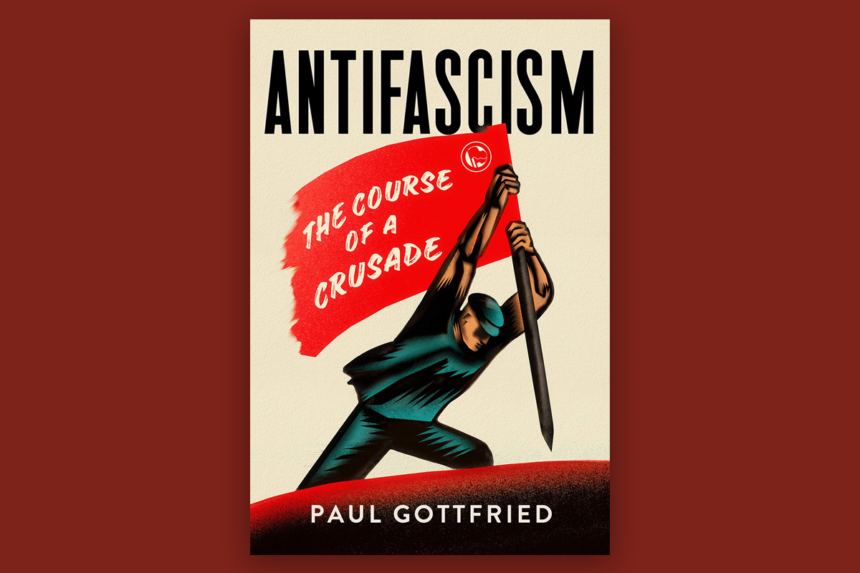Authoring a book comes with its usual praise and criticism and my latest book, Antifascism: Course of a Crusade, is no exception. One of my critics is the Canadian journalist and columnist at The Nation, Jeet Heer. His review leaves me wondering whether he has actually read my work, which charts the historical roots of the modern antifascist movement.
According to my critic, I—along with others like writer John Vella, who wrote a legitimate review of my book in The American Conservative—are laboring to rehabilitate Italian fascism. Those who have actually read my monograph will realize that I have not produced a lament for the lost glories of Mussolini’s Italy. Although I deal with the Italian attempt to build a fascist state, I am also quite critical of Mussolini’s career, especially his involvement with Hitler’s Third Reich and the unfortunate anti-Semitic laws that Il Duce issued in September 1938.
But Heer is irritated that still I notice the gigantic differences in degrees of tyranny between the nasty Third Reich and the authoritarian Italian fascist state before its takeover by Nazi Germany in 1943. I have no idea why my failure to denounce fascist Italy in a way that would please my critic constitutes a whitewash.
Also, to Heer’s obvious displeasure, my book tries to show why Italian fascism became an attractive model for interwar national movements, including black and Jewish ones. I examine why young nationalists, who did not intend to murder minorities and who had no interest in making alliances with the Third Reich, were deeply attracted to Italian fascism. Explaining such matters may be as worthwhile an activity as clarifying why the woke left continues to venerate Communist mass murders and outspoken homophobes, a subject that my book most definitely explores. Has Heer ever wondered, as I have for decades, why the woke left continues to pay tribute to Castro, Che Guevara, and Mao, all mass murders who committed much worse crimes than did Mussolini?
If Heer had carefully read my monograph, he would have noticed that I did not produce a screed from the crazy right. Indeed, the second chapter of my book even pays fulsome tribute to those Marxists who treated fascism in a coherent, systematic way. I view these leftist theorists as models of critical analysis and praise the thoroughness with which they examined fascism as a counterrevolutionary movement allied to the capitalist class. Although I am not of their persuasion, my book has nice things to say about German Marxists who came up with usable explanations for Hitler’s dictatorship. But these facts do not faze Heer. Instead, he focuses on the fact that I knew Richard Spencer and collaborated with him on an anthology. Never mind that this collaboration occurred before Spencer went off the deep end into white nationalism; Heer presumes in his brief that my past association with Spencer is a clinching argument.
What irks Heer, and other leftist critics of my work, is that I diss their brand of antifascism. I dislike their hysterics and their efforts to brand those on the right who disagree with them as “fascists.” Moreover, I don’t play the game that I hear on Fox News of presenting the woke left as the grim return of the Marxist Communist monster. The modern antifa leftists are no more Marxists than Dodo birds; they are just loudmouthed bullies who vent hatred on normal people. They entirely lack the mental discipline and bourgeois morality that characterized the Marxists of my youth.
Nonetheless they are bona fide antifascists, as my book demonstrates. Woke leftists deny unchangeable specificities, such as definite ethnicities or sexualities. Antifascist woke leftists believe that, in contrast to fascism’s ascription of fixed identities, human persons have totally fluid essences that can be changed from one minute to the next. The only practical exception to this rule that has emerged concerns the right to call oneself black, which apparently is so exalted a victim category that it cannot be attached to someone who is not inherently of the black race.
Incidentally, the ending of Heer’s invective gives him away as someone who never read my book. “Gottfried and Vella can best be understood as trying to revive that earlier tradition of apologia for and minimization of fascism. But their argument is rife with contradictions: fascism, we’re told, was not so bad, it was also really leftism (which is bad),” Heer writes.
Since neither John Vella nor I provide an “apologia” for fascism, we may assume that Heer is merely indulging in ritualistic leftist accusations. But more interestingly, he states that I treat fascism as belonging to the left. No one who is familiar with my book on fascism, or this sequel could ever reach Heer’s conclusion, as my work repeatedly presents Latin fascism as a movement of the right. It also emphatically disputes the view that there is some kind of direct line going from the revolutionary left to the Third Reich.
Thus, it seems apparent that the only sources that went into Heer’s assessment of my scholarship were the ones that he looked at: namely John Vella’s American Conservative review and a commentary of mine that appeared in Canada’s National Post in 2018. In the latter commentary, I defended myself against the false charge that I had spawned the racialist views that are now associated with the alt-right. Heer and other leftists would do well to read my work before presuming to attack it based on a dubious assumption about my motives.
